Abstract
Purpose
Controversial associations between single-nucleotide polymorphisms (rs2279744, rs937283, rs3730485) of the MDM2 gene and the etiology of squamous cell carcinomas (SCCs) have been reported. This merits further comprehensive assessment.
Materials and methods
We systematically reviewed the available data and conducted an updated meta-analysis to evaluate the genetic effect of MDM2 polymorphisms in SCC susceptibility, using Stata/SE 12.0 software.
Results
After screening, 7,987 SCC cases and 12,954 controls from 26 eligible case–control studies were enrolled. Overall, compared with the control group, a significantly increased SCC risk was observed for the MDM2 rs2279744 polymorphism in the Asian population (test of association: odds ratio [OR] 1.12, P=0.027 for G vs T; OR 1.26, P=0.016 for GG vs TT; OR 1.25, P<0.001 for GG vs TT + TG; and OR 1.08, P=0.023 for carrier G vs T). In subgroup analysis by SCC type, a similarly increased esophageal SCC risk was detected (OR 1.19, P<0.001 for G vs T; OR 1.46, P<0.001 for GG vs TT; and OR 1.48, P=0.005 for GG vs TT + TG). Furthermore, MDM2–TP53 double mutation was statistically associated with increased SCC susceptibility overall (OR 1.52, P=0.001), especially in the Asian population (OR 1.49, P=0.022). However, no significant difference between the control and case groups was obtained for MDM2 rs937283 or rs3730485 under any genetic model (all P>0.05).
Conclusion
Our results highlight a positive association between the GG genotype of MDM2 rs2279744 polymorphism and an increased risk of esophageal SCC in the Asian population, which needs to be clarified by more large-scale studies.
Keywords:
Introduction
The MDM2 gene maps to chromosome 12q14.3–q15.Citation1 The MDM2 protein forms a complex with the p53 protein, attenuates the activity of p53, and promotes the subsequent degradation of p53 by acting as a ubiquitin E3 ligase for p53.Citation2,Citation3 The abnormal expression of the MDM2/TP53 genes is linked to carcinogenesis or malignant transformation.Citation2,Citation4,Citation5 Accumulating evidence supports the link between the alteration of protein structural/functional behavior and single-nucleotide polymorphisms (SNPs) within relative genes.Citation6–Citation11 Multiple prediction or detection techniques, such as structural biology, computational platform, and molecular dynamic simulation, contribute to the investigation of identification and function of disease-associated SNPs.Citation6–Citation11 The SNPs of rs2279744 (T309G or SNP309), rs3730485 (del1518+/−) and rs937283 (A2164G), have been identified in the human MDM2 gene.Citation12,Citation13 Previous reports have shown that MDM2 polymorphisms are associated with susceptibility to various clinical diseases, such as bladder cancer,Citation14 hepatocellular carcinoma,Citation15 myelodysplastic syndromes,Citation16 and leukemia.Citation17,Citation18
Keratinization of the epidermal cells often leads to the occurrence of squamous cell carcinoma (SCC), which behaves as the uncontrolled growth of outer abnormal squamous cells of the epidermis.Citation19–Citation21 Specific types of SCC, such as head and neck SCC (HNSCC), skin squamous cell carcinoma (SSCC), esophageal SCC (ESCC), oral SCC (OSCC), lung SCC (LSCC), and cervical squamous cell carcinoma (CSCC), have been described.Citation19–Citation23
The different effects of the genetic mutations within MDM2 have been reported to be related to the carcinogenesis of specific SCC types. For example, a lower plasma MDM2 level was observed in laryngeal SCC patients with the GT genotype of MDM2 rs2279744 than the TT genotype.Citation24 The prevalence of MDM2 rs2279744 might be involved in OSCC onset, rather than increased OSCC risks.Citation25 Although several previous meta-analyses on the correlation between MDM2 rs2279744 polymorphism and the risks of HNSCC, OSCC, or ESCC have been reported,Citation26–Citation28 another systematic evaluation with enlarged statistical power is still meaningful. Moreover, the meta-analyses of the association between MDM2 rs937283 and rs3730485 polymorphisms and SCC risks, or between the MDM2 rs2279744 polymorphism and other SCC types, such as SSCC and CSCC, have not been reported yet. It was thus worthwhile carrying out an updated systematic review and meta-analysis, in order to reassess the genetic relationship between common MDM2 polymorphisms (rs2279744, rs937283, and rs3730485) and the overall risks of SCC.
Materials and methods
Article search
We searched for potentially relevant articles (up to May 7, 2016) from seven electronic databases: PubMed, Web of Science, Cochrane, Scopus, Chinese National Knowledge Infrastructure (CNKI), Wanfang, and Weipu. The key terms were as follows: mouse double minute 2 homolog; proto-oncogene proteins c-mdm2; MDM2; MDM2 proto-oncogene, E3 ubiquitin protein ligase; human homolog of mouse double minute 2; murine double minute 2; polymorphism; mutation; SNP; single nucleotide polymorphism; T309G; rs2279744; A2164G; rs937283; del1518; rs3730485; G285C; rs117039649; squamous cell carcinoma; carcinoma, squamous cell; and SCC.
Article screening and data extraction
With the help of EndNote X7 software, potential articles were screened for eligibility according to our strict inclusion/exclusion criteria. Exclusion criteria were duplicated articles, review or conference abstract, not human or clinical data, not relevant to MDM2, not about SCC, meta-analysis, not relevant to mutation, lack of control data, and overlapped data. Eligible case–control studies needed to be linked to SCC risks and contain data on individual genotype numbers of MDM2 rs2279744, rs937283, and rs3730485 polymorphisms. We independently extracted the following data: first author, year of publication, country, ethnicity, SNPs, sample sizes and genotype frequencies of case/control group, SCC type, source of control, genotyping assay, P-values of Hardy–Weinberg equilibrium (HWE), and test of control groups. A detailed discussion was required for the conflicting assessment.
Statistical analysis
Pooled odds ratios (ORs) with 95% confidence intervals (CIs) and P-values of associations based on Mantel–Haenszel statistics were calculated by Stata 12.0 software (StataCorp LP, College Station, TX, USA). P>0.05 was considered the exclusion of statistically significant difference between case and control groups. The I2 test (0%–100%) and Q-statistic were adopted to evaluate the potential heterogeneities across case–control studies. I2>25% or P-value of Q-statistic <0.1 was considered significant heterogeneity, and statistical analysis under a random-effect model and sensitivity analysis were conducted. Six genetic (allele, homozygote, heterozygote, dominant, recessive, and carrier) models were employed. Subgroup analyses by ethnicity, source of controls, HWE or SCC types were also performed. In addition, potential publication bias was assessed by analysis of Begg’s funnel plots (continuity-corrected) and Egger’s publication-bias plots.
Results
Studies selected for meta-analysis
shows a flow diagram of our article-search strategy. A total of 545 potentially relevant articles were retrieved initially from the databases: PubMed (n=95), Web of Science (n=260), Cochrane (n=0), Scopus (n=73), CNKI (n=54), Wanfang (N=44), and Weipu (n=19). A total of 378 articles were obtained after duplicates had been removed by the EndNote software, and then 336 articles were excluded by screening titles and abstracts according to the exclusion criteria. Specific information is shown in . Next, 42 full-text articles were assessed for eligibility; 16 articles were then excluded for lack of control data (n=10) and overlapped data (n=6). Finally, 26 independent articles with 7,987 SCC cases and 12,954 controls were selected for our meta-analysis.Citation4,Citation12,Citation13,Citation18,Citation24,Citation25,Citation29–Citation48 We then carefully extracted the data and summarized the characteristics ().
Figure 1 Flow diagram of article-search strategy for meta-analysis.
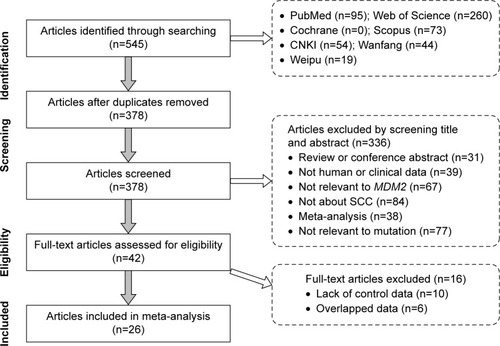
Table 1 Characteristics of studies included for meta-analysis
Polymorphism rs2279744 of MDM2 and SCC susceptibility
A total of 25 case–control studiesCitation4,Citation12,Citation13,Citation18,Citation24,Citation25,Citation30–Citation48 were enrolled for the meta-analysis of MDM2 rs2279744 and risks of SCC. As shown in , the results (G vs T, I2=70.0%, P<0.001; GG vs TT, I2=59.1%, P<0.001; TG vs TT, I2=72.9%, P<0.001; TG + GG vs TT, I2=73.7%, P<0.001; GG vs TT + TG, I2=36.3%, P=0.04; carrier G vs T, I2=31.5%, P=0.068) suggested that between-study heterogeneity existed for MDM2 rs2279744. The random-effect model was thus applied for meta-analysis. The pooled results further showed that an increased SCC risk was observed under the allele model (, G vs T, OR 1.09, 95% CI 1–1.19; P=0.041), homozygote model (GG vs TT, OR 1.17, 95% CI 1.02–1.36; P=0.03), and recessive model (GG vs TT + TG, OR 1.18, 95% CI 1.07–1.30; P=0.001), but not other genetic models. Forest plots can be seen for meta-analysis of the allele (), homozygote (), heterozygote (), dominant (), and recessive () models. These data revealed that the GG genotype of MDM2 rs2279744 was statistically associated with increased SCC susceptibility.
Figure 2 Meta-analysis of the association between MDM2 rs2279744 and SCC susceptibility under the G vs T model.
Abbreviations: SCC, squamous cell carcinoma; OR, odds ratio; CI, confidence interval.
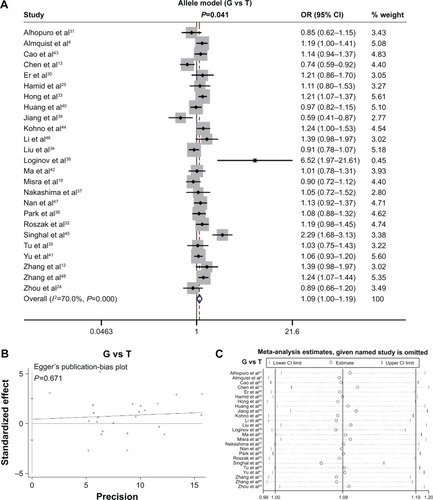
Figure 3 Meta-analysis of the association between MDM2 rs2279744 and SCC susceptibility under the GG vs TT model.
Abbreviations: SCC, squamous cell carcinoma; OR, odds ratio; CI, confidence interval.
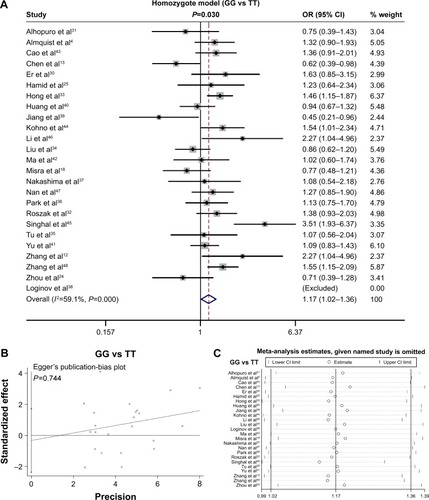
Figure 4 Meta-analysis of the association between MDM2 rs2279744 and SCC susceptibility under the TG vs TT model.
Abbreviations: SCC, squamous cell carcinoma; OR, odds ratio; CI, confidence interval.
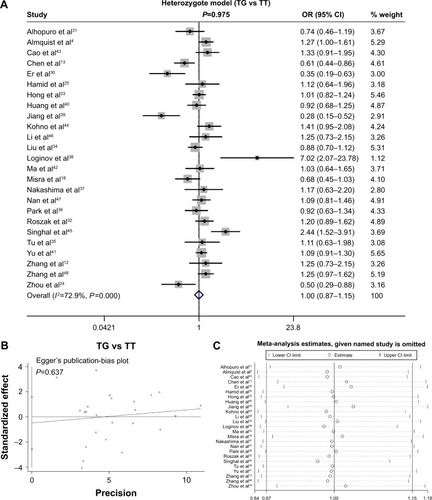
Figure 5 Meta-analysis of the association between MDM2 rs2279744 and SCC susceptibility under the TG + GG vs TT model.
Abbreviations: SCC, squamous cell carcinoma; OR, odds ratio; CI, confidence interval.
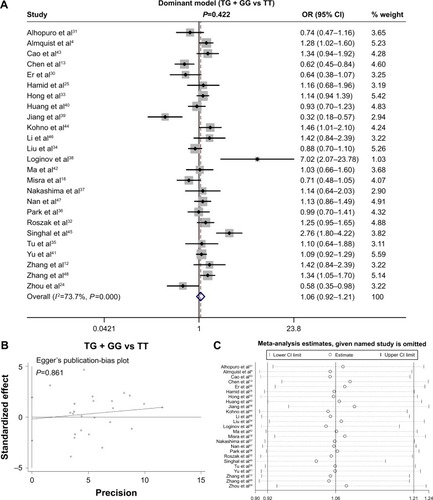
Figure 6 Meta-analysis of the association between MDM2 rs2279744 and SCC susceptibility under the GG vs TT + TG model.
Abbreviations: SCC, squamous cell carcinoma; OR, odds ratio; CI, confidence interval.
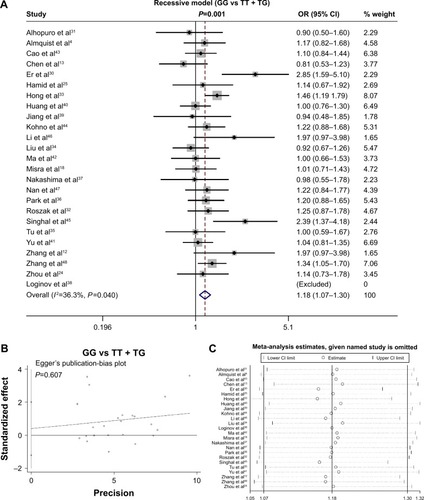
Table 2 Meta analysis of the association between MDM2 polymorphisms (rs2279744, rs937283, and rs3730485) and SCC susceptibility
Furthermore, subgroup analyses by ethnicity (Asian/Caucasian), HWE (P>0.05/P<0.05), source of control (population-based/hospital-based), and SCC type (HNSCC/SSCC/ESCC/OSCC/CSCC/LSCC) were performed for all genetic models. As shown in , a significantly increased SCC risk was observed in the Asian population in four models (G vs T, OR 1.12, P=0.027; GG vs TT, OR 1.26, P=0.016; GG vs TT + TG, OR 1.25, P<0.001; carrier G vs T, OR 1.08, P=0.023). Similar results were obtained in the HWE P>0.05 group and the population-based group for the allele, homozygote, recessive, and carrier models (, all OR >1, P<0.05). These data further indicated an association between the GG genotype of MDM2 rs2279744 and increased SCC susceptibility in the Asian population. The results of stratified analyses by SCC type showed that a significantly increased ESCC risk was observed for three models (; G vs T, OR 1.19, P<0.001; GG vs TT, OR 1.46, P<0.001; GG vs TT + TG, OR 1.48, P=0.005). In addition, an increased SSCC risk was observed in the G vs T model (, OR 1.16, P=0.022) and the TG + GG vs TT model (OR 1.22, P=0.028), while an increased LSCC risk was only observed in the TG + GG vs TT model (, OR 1.18, P=0.045). In contrast, no significant difference was observed for OSCC and CSCC group in any genetic models (, test of association, all P>0.05). These data further suggested that patients with the GG genotype of MDM2 rs2279744 appeared to be at a higher risk of developing ESCC in the Asian population.
Table 3 Subgroup analysis by ethnicity, source of controls, and HWE for association between MDM2 rs2279744 and SCC susceptibility
Table 4 Subgroup analysis by disease type for association between MDM2 rs2279744 and SCC susceptibility
Polymorphisms rs937283 and rs3730485 of MDM2 and SCC susceptibility
Next, pooled analysis for the association between the rs937283 and rs3730485 polymorphisms of MDM2 and the risks of SCC was conducted (). A random-effect model was used for the comparison of G vs A, GG vs AA, AG vs AA, AG + GG vs AA, due to the presence of heterogeneity (all heterogeneity tests, I2>50%), whereas a fixed-effect model was used for others. No significant difference was observed for any genetic models (, test of association, all P>0.05). The data failed to provide strong evidence regarding the association between the rs937283 and rs3730485 polymorphisms of MDM2 and overall SCC susceptibility.
MDM2/TP53 mutations and SCC susceptibility
The MDM2 rs2279744 polymorphism has been reported to suppress the p53 pathway via the modulation of MDM2 expression.Citation2,Citation49 We also investigated the genetic relationship between SCC risks and MDM2/TP53 mutations, including MDM2+/TP53−, MDM2−/TP53+, and MDM2+/TP53+. Specific genotype information is shown in . A random-effect model was used. The data in show significant differences for the MDM2+/TP53+ double mutation in the overall population (test of association, OR 1.52, 95% CI 1.19–1.95; P=0.001) and the Asian population (test of association, OR 1.49, 95% CI 1.06–2.11; P=0.022). However, no significant difference was observed for other mutations (test of association, all P>0.05). According to our data, the combined effect of the MDM2/TP53 double mutation may contribute to an increased SCC risk, especially in the Asian population.
Table 5 Meta-analysis of association between MDM2ITP53 mutations and SCC susceptibility
Publication bias and sensitivity analysis
The results of Begg’s funnel plots and Egger’s publication-bias plots demonstrated that the occurrence of large publication bias was excluded under all genetic models ( and , all P>0.05), apart from the mutations of MDM2+/TP53− and MDM2+/TP53+ in the Caucasian group (, Egger’s publication-bias plot, P<0.05). Egger’s funnel plots of publication bias for the allele (), homozygote (), heterozygote (), dominant (), and recessive () models of MDM2 rs2279744 polymorphism are shown. With regard to the sensitivity analysis, compared with overall meta-analysis data, no significant difference for the pooled OR value was observed when each study was omitted sequentially ( for allele model of MDM2 rs2279744; for homozygote model; for heterozygote model; for dominant model; for recessive model; data not shown for others). Consequently, these data suggested that our statistical results were credible.
Discussion
More and more studies on the possible role of the MDM2 rs2279744 polymorphism in the onset and development of cancer have been reported. Hu et al performed a meta-analysis based on 25 published case–control studies, and reported that MDM2 rs2279744 seems to be associated with tumor susceptibility.Citation50 Chen et al reported that the MDM2 rs2279744 polymorphism may be linked to an increased digestive tract cancer risk in the Asian population.Citation51 Here, we further focused on the potential effect of MDM2 rs2279744 in susceptibility to overall SCC and specific SCC types, including HNSCC, SSCC, ESCC, OSCC, CSCC, and LSCC.
Several SCC-related meta-analyses have been carried out previously. A meta-analysis by Liu et al based on seven articles with 1,629 cases and 2,472 controls showed that the G allele of the MDM2 rs2279744 polymorphism seemed to act as an important HNSCC protective factor in the Caucasian population, but not the Asian population.Citation26 However, in our meta-analysis, we were unable to observe a significant association between HNSCC susceptibility and MDM2 rs2279744. How to explain this? Seven studies were enrolled in the meta-analysis of Liu et al.Citation13,Citation18,Citation25,Citation31,Citation33,Citation35,Citation37 Also, data for OSCC in five studiesCitation13,Citation18,Citation25,Citation33,Citation35 were included as HNSCC. The disease in two studiesCitation31,Citation37 was defined only as HNSCC. In our subgroup analysis, we tested the relationship between OSCC risk and MDM2 rs2279744. One new studyCitation41 was added in the new meta-analysis for HNSCC. We found that the MDM2 rs2279744 polymorphism did not appear to be associated with OSCC susceptibility, which is partly consistent with the results of Xie et al.Citation27
A meta-analysis by Chen et al based on six case–control studies, including 1,899 cases and 3,016 controls, showed that the MDM2 rs2279744 polymorphism may be associated with increased risks of overall esophageal cancer, including SCC and adenocarcinoma, especially in the Asian population.Citation28 However, our meta-analysis only targeted the ESCCs. We thus removed one study on esophageal adenocarcinomaCitation52 and added another new published case–control study.Citation12 All cases in six case–control studies were Chinese patients, with a mean age of >50 years and male:female ratio of >50%. The GG genotype of MDM2 rs2279744 was likely to confer an increased susceptibility to ESCC in elderly male patients in People’s Republic of China. The influence of habits and customs, such as drinking or smoking, should be considered.
Considering the close association between MDM2 and p53,Citation2–Citation5 it is meaningful to investigate the role of gene–gene interaction between MDM2 and TP53 Arg72Pro polymorphism in SCC risks. In our meta-analysis, we observed a positive association between MDM2+/TP53+ double mutation and SCC susceptibility in overall or Asian populations. The underlying molecular mechanism on the effect of MDM2 genetic variation in the incidence of ESCC remains unclear. The rs2279744 SNP within the promoter region of MDM2 can lead to a T–G substitution at the 309 nucleotide site, which is closely linked to the high expression of the MDM2 protein via higher binding affinity with the transcriptional activator SP1, and thus enhances the degradation of p53.Citation2 It was possible that MDM2 rs2279744 polymorphism is linked to the increased SCC risks, through influencing the role of p53 pathway in genomic stability and tumor prevention. Chen et al conducted a meta-analysis to investigate the relationship between positive MDM2 expression and clinicopathological characteristics of ESCC, and found that high MDM2 expression was associated with early primary tumor stage and increased risk of regional lymph node metastasis, but not the risk of distant metastasis.Citation53 Vlatković et al reported that loss of MTBP expression seems to be associated with reduced survival in some patients with HNSCC.Citation54 In addition, several reported studies have estimated the role of the interaction between the MDM2/TP53 gene and several environmental factors, including smoking exposure, alcohol consumption, or human papillomavirus infections in SCC susceptibility.Citation13,Citation29,Citation38,Citation40,Citation41 For instance, rs2279744 and rs937283 of MDM2 might be associated with the occurrence of OSCC patients with HPV16 L1 seropositivity.Citation13 However, due to the lack of sufficient data, we failed to carry out a subgroup analysis based on these environmental factors.
Our meta-analysis contained several limitations. Very few publications resulted in small sample sizes for the analysis of MDM2 rs937283 and rs3730485. The possible effect of other unpublished studies on our negative conclusion should be taken into consideration. The same limitation of sample size existed in the meta-analysis of MDM2/TP53 double mutation and several subgroup analyses of the MDM2 rs2279744 polymorphism. Heterogeneity and potential publication bias may weaken our conclusion. Demographic features, lifestyle, or clinical characteristics were not considered, due to the lack of data. Larger and independent studies are required to validate the association between MDM2/TP53 mutations and susceptibility to different types of SCC.
Conclusion
Our updated meta-analysis demonstrated that there is a positive association between increased overall SCC risks and the MDM2 rs2279744 polymorphism, rather than rs937283 or rs3730485. We further provided evidence that the GG genotype of MDM2 rs2279744 is more likely to confer an increased genetic susceptibility to ESCC in the Asian population, particularly in Chinese. MDM2 rs2279744 may be a valuable risk factor or diagnostic biomarker for patients with ESCC in People’s Republic of China, and needs more supporting evidence.
Disclosure
The authors report no conflicts of interest in this work.
References
- MendozaMMandaniGMomandJThe MDM2 gene familyBiomol Concepts20145191925372739
- BondGLHuWBondEEA single nucleotide polymorphism in the MDM2 promoter attenuates the p53 tumor suppressor pathway and accelerates tumor formation in humansCell2004119559160215550242
- WeiJYangYLuMEscape, or vanish: control the fate of p53 through MDM2-mediated ubiquitinationAnticancer Agents Med Chem201516217418926343143
- AlmquistLMKaragasMRChristensenBCThe role of TP53 and MDM2 polymorphisms in TP53 mutagenesis and risk of non-melanoma skin cancerCarcinogenesis201132332733021123835
- ZhangQZengSXLuHTargeting p53-MDM2-MDMX loop for cancer therapySubcell Biochem20148528131925201201
- RajendranVStructural analysis of oncogenic mutation of isocitrate dehydrogenase 1Mol Biosyst20161272276228727194485
- KumarARajendranVSethumadhavanRPurohitRIn silico prediction of a disease-associated STIL mutant and its affect on the recruitment of centromere protein J (CENPJ)FEBS Open Bio20122285293
- KumarAPurohitRComputational screening and molecular dynamics simulation of disease associated nsSNPs in CENP-EMutat Res2012738–7392837
- KamarajBRajendranVSethumadhavanRKumarCVPurohitRMutational analysis of FUS gene and its structural and functional role in amyotrophic lateral sclerosis 6J Biomol Struct Dyn201533483484424738488
- PurohitRRole of ELA region in auto-activation of mutant KIT receptor: a molecular dynamics simulation insightJ Biomol Struct Dyn20143271033104623782055
- KumarAPurohitRUse of long term molecular dynamics simulation in predicting cancer associated SNPsPLoS Comput Biol2014104e100331824722014
- ZhangLZhuZWuHWangKAssociation between SNP309 and del1518 polymorphism in MDM2 homologue and esophageal squamous cell carcinoma risk in Chinese population of Shandong ProvinceAnn Clin Lab Sci201545443343726275695
- ChenXSturgisEMLeiDDahlstromKWeiQLiGHuman papillomavirus seropositivity synergizes with MDM2 variants to increase the risk of oral squamous cell carcinomaCancer Res201070187199720820736372
- XieLSunYChenTAssociation between MDM2 SNP309 T>G polymorphism and the risk of bladder cancer: new data in a Chinese population and an updated meta-analysisOnco Targets Ther201583679369026672516
- QiuMLiuYYuXInteraction between p53 codon 72 and MDM2 309T>G polymorphisms and the risk of hepatocellular carcinomaTumour Biol20163733863387026476535
- McGrawKLCluzeauTSallmanDATP53 and MDM2 single nucleotide polymorphisms influence survival in non-del(5q) myelodysplastic syndromesOncotarget2015633344373444526416416
- HeXChenPYangKAssociation of MDM2 polymorphism with risk and prognosis of leukemia: a meta-analysisActa Haematol2015133436537125790771
- MisraCMajumderMBajajSGhoshSRoyBRoychoudhurySPolymorphisms at p53, p73, and MDM2 loci modulate the risk of tobacco associated leukoplakia and oral cancerMol Carcinog200948979080019204927
- MaKCaoBGuoMThe detective, prognostic, and predictive value of DNA methylation in human esophageal squamous cell carcinomaClin Epigenetics201684327110300
- KumarSShahJPBryantCSPrognostic significance of keratinization in squamous cell cancer of uterine cervix: a population based studyArch Gynecol Obstet20092801253219043726
- MarurSForastiereAAHead and neck squamous cell carcinoma: update on epidemiology, diagnosis, and treatmentMayo Clin Proc201691338639626944243
- StratigosAGarbeCLebbeCDiagnosis and treatment of invasive squamous cell carcinoma of the skin: European consensus-based interdisciplinary guidelineEur J Cancer201551141989200726219687
- DermanBAMilehamKFBonomiPDBatusMFidlerMJTreatment of advanced squamous cell carcinoma of the lung: a reviewTransl Lung Cancer Res20154552453226629421
- ZhouJLiuFZhangDSignificance of MDM2-309 polymorphisms and induced corresponding plasma MDM2 levels in susceptibility to laryngeal squamous cell carcinomaDNA Cell Biol2014332889424325471
- HamidSYangYHPengKNMDM2 SNP309 does not confer an increased risk to oral squamous cell carcinoma but may modulate the age of disease onsetOral Oncol200945649650018804411
- LiuJZhengYLeiDMDM2 309T>G polymorphism and risk of squamous cell carcinomas of head and neck: a meta-analysisAsian Pac J Cancer Prev20111281899190322292622
- XieJLYangJLLiuDSXieYGJiPImpact of MDM2 single nucleotide polymorphism on oral squamous cell carcinoma riskCell Biochem Biophys201571299399825323564
- ChenBXiongMMMengXLCurrent evidence on the relationship between murine double minute 2 T309G polymorphism and esophageal cancer susceptibilityDis Esophagus201528659360124844868
- YangJLiuBLiWAssociation of p53 and MDM2 polymorphisms with risk of human papillomavirus (HPV)-related esophageal squamous cell carcinoma (ESCC)Cancer Epidemiol201337562963323837945
- ErLMZhangLWNieWWRelevance of MDM2 polymorphisms with esophageal squamous cell carcinoma, gastric adenocarcinoma and double primary cancers in esophagus and stomachZhonghua Yu Fang Yi Xue Hui2012391333423344
- AlhopuroPYlisaukko-OjaSKKoskinenWJThe MDM2 promoter polymorphism SNP309T–>G and the risk of uterine leiomyosarcoma, colorectal cancer, and squamous cell carcinoma of the head and neckJ Med Genet200542969469816141004
- RoszakAMisztalMSowińskaAJagodzińskiPPMurine double-minute 2 homolog single nucleotide polymorphisms 285 and 309 in cervical carcinogenesisMol Diagn Ther201519423524426224627
- HongYMiaoXZhangXThe role of P53 and MDM2 polymorphisms in the risk of esophageal squamous cell carcinomaCancer Res200565209582958716230424
- LiuGWheatley-PricePZhouWGenetic polymorphisms of MDM2, cumulative cigarette smoking and nonsmall cell lung cancer riskInt J Cancer2008122491591817957785
- TuHFChenHWKaoSYLinSCLiuCJChangKWMDM2 SNP 309 and p53 codon 72 polymorphisms are associated with the outcome of oral carcinoma patients receiving postoperative irradiationRadiother Oncol200887224325218423915
- ParkSHChoiJEKimEJMDM2 309T>G polymorphism and risk of lung cancer in a Korean populationLung Cancer2006541192416876289
- NakashimaMKondoSShimizuYImpact of MDM2 single nucleotide polymorphism on tumor onset in head and neck squamous cell carcinomaActa Otolaryngol2008128780881318568525
- LoginovVIAtkarskaiaMVBurdennyĭAMAssociation of Arg72Pro of TP53 and T309G of MDM2 genes polymorphisms with non-small-cell lung cancer in Russians of the Moscow regionMol Biol (Mosk)20144815257 Russian
- JiangPLiuJWLiWZengXXTangJXCorrelation between MDM2 gene SNP309 polymorphisms and cervical cancerClin Oncol Cancer Res201138114
- HuangSFChenIHLiaoCTWangHMLiouSHHsiehLLCombined effects of MDM2 SNP 309 and p53 mutation on oral squamous cell carcinomas associated with areca quid chewingOral Oncol2009451162218487080
- YuHHuangYJLiuZEffects of MDM2 promoter polymorphisms and p53 codon 72 polymorphism on risk and age at onset of squamous cell carcinoma of the head and neckMol Carcinog201150969770621656578
- MaJZhangJNingTChenZXuCAssociation of genetic polymorphisms in MDM2, PTEN and P53 with risk of esophageal squamous cell carcinomaJ Hum Genet201257426126422336889
- CaoYYZhangXFGuoWWangRHui GeHZhangJHAssociation of the MDM2 polymorphisms with susceptibility of esophageal squamous cell carcinoma and that of gastric cardiac adenocarcinomaTumor2007278628632
- KohnoTKunitohHMimakiSContribution of the TP53, OGG1, CHRNA3, and HLA-DQA1 genes to the risk for lung squamous cell carcinomaJ Thorac Oncol20116481381721623257
- SinghalPHussainSThakurNAssociation of MDM2 and p53 polymorphisms with the advancement of cervical carcinomaDNA Cell Biol2013321192723210739
- LiRZhangLLiuZCorrelation of MDM2 gene polymorphisms and risk of esophageal squamous cell carcinoma in south-west Shandong Han nationalityJ Xinxiang Med Coll2011284437439
- NanHQureshiAAHunterDJHanJA functional SNP in the MDM2 promoter, pigmentary phenotypes, and risk of skin cancerCancer Causes Control200920217117918814047
- ZhangXMMiaoXPGuoYLGenetic polymorphisms in cell cycle regulatory genes MDM2 and TP53 are associated with susceptibility to lung cancerHum Mutat200627111011716287156
- BondGLHuWLevineAA single nucleotide polymorphism in the MDM2 gene: from a molecular and cellular explanation to clinical effectCancer Res200565135481548415994915
- HuZJinGWangLChenFWangXShenHMDM2 promoter polymorphism SNP309 contributes to tumor susceptibility: evidence from 21 case-control studiesCancer Epidemiol Biomarkers Prev200716122717272318086778
- ChenBCaoLHuKWZhangJWMengXLXiongMMMDM2 SNP309 is an ethnicity-dependent risk factor for digestive tract cancersTumour Biol20143543431343824338709
- LiuGCesconDWZhaiRp53 Arg72Pro, MDM2 T309G and CCND1 G870A polymorphisms are not associated with susceptibility to esophageal adenocarcinomaDis Esophagus2010231363919302219
- ChenJYYangHWenJAssociation between positive murine double minute 2 expression and clinicopathological characteristics of esophageal squamous cell carcinoma: a meta-analysisDis Esophagus Epub2015415
- VlatkovićNEl-FertADevlingTLoss of MTBP expression is associated with reduced survival in a biomarker-defined subset of patients with squamous cell carcinoma of the head and neckCancer2011117132939295021692053
